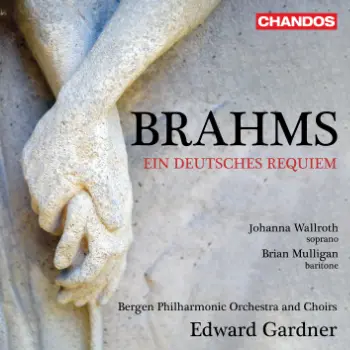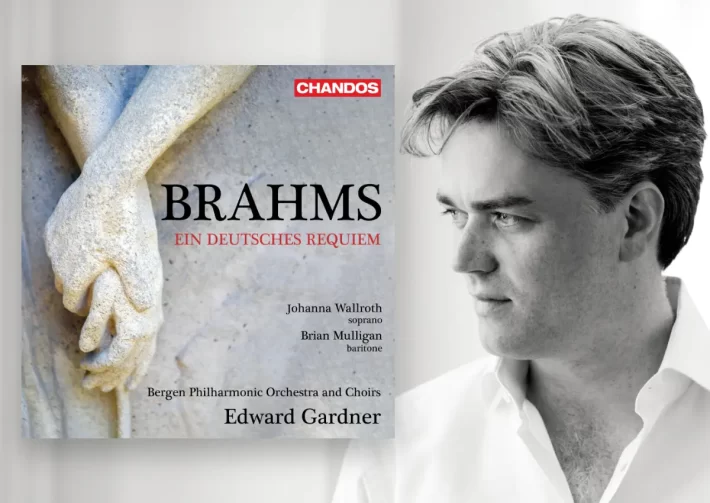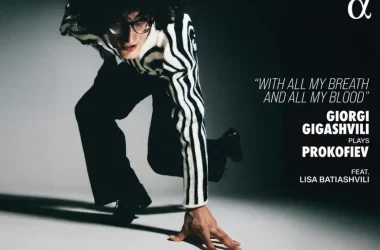Chandos has recorded the Brahms German Requiem twice before: in 1991 with the London Symphony Orchestra and Chorus under Richard Hickox, and in 2003 with the Danish National Symphony Orchestra and Choir under Gerd Albrecht. This new release (in Super Audio sound and Dolby Atmos) features the Bergen Philharmonic Orchestra and three choirs, led by Edward Gardner.

Check offers of this album on Amazon.
It is an impressive performance that conveys a deeply satisfying sense of consolation. Gardner paces each movement well, though the third movement fugue is perhaps the fastest performance I know. The big contrapuntal sections have both clarity and warmth, though occasionally I would have welcomed sharper instrumental articulation and crisper diction (the choir’s backward balance is partly to blame, and the same issue affects the earlier Danish performance).
The Bergen Philharmonic’s playing, both as an ensemble and in solos, is consistently beautiful (sample the oboe’s gorgeous playing in the opening movement). The three choirs produce a richly upholstered tone, as does baritone Brian Mulligan, though he seems unwilling to ever sing a true piano dynamic. Soprano Johanna Wallroth has no issues with the fifth movement’s high-lying tessitura. And yet despite these excellent qualities, the performance rarely moves me. This is because I am hard-pressed to list attributes of this reading that make it stand above numerous other recordings with similar virtues. (I would state the same about this team’s 2019 album of the Brahms first and third symphonies, reviewed here).
This is a reading primarily focused on comfort, and this was certainly the composer’s intent. But as we seek consolation after the death of a loved one, we go through differing stages of grief – anger, bewilderment, frustration, helplessness – and the performances that have touched me most deeply all manage to evoke that complex tangle of emotions.
That is certainly true of the classic Klemperer recording (Warner Classics), in large part because of the heart-rending singing of the superb Philharmonia Chorus. And the masterful use of rubato and elastic phrasing to heighten text expression – one example among many: the gentle increase in tempo at “Die mit Tränen säen/They that sow in tears” (movement 1) so that the melody’s descending seconds mimic flowing tears. From the opening movement’s first note to the final movement’s Coda, the music flows with an organic inevitability that few others match.
Rattle’s 2007 Berlin recording (Warner Classics) has a similar emotional power (again, winds balanced well to the fore like Klemperer). Berlin’s opulent strings are often reigned in, conjuring a fragile, more intimate mood. Again, like Klemperer the use of rubato is telling; In the first movement, in the second clause of the same sentence mentioned above, the sudden quickening at “werden mit Freuden ernten/shall reap in joy” draws our attention to joy. The singing of the (fully professional) Rundfunkchor Berlin allows for a sophisticated shaping of text and phrasing, as well as spine-tingling pianissimo singing. Some will argue that Rattle is micromanaging, but I find it convincing and profoundly moving.
Blomstedt’s San Francisco recording (Decca) has the same organic sweep as Klemperer, its chorus arguably even finer (a testament of the brilliance of Chorus Master Vance George). There is an incandescent intensity in the playing and singing that sets this reading apart, and I know of no other recording in which the weight and depth of the organ has such presence (listen to how it magnifies the power of the third movement’s Coda).
These three readings (as well as Gardner’s first recording, originally on Philips) more fully explore and express the morass of emotions felt at the loss of a loved one. They also express the comfort Brahms intended, but they do so by acknowledging those other emotions, which makes the feeling of consolation at the end of the work more poignant. And I am convinced that is what Brahms intended. Those who feel differently may find Gardner’s steady focus on comfort speaks to you more clearly than it did me.


Check offers of this album on Amazon.
Album Details |
|
|---|---|
| Album name | Brahms: Ein Deutsches Requiem |
| Label | CHANDOS |
| Catalogue No. | 5271 |
| Amazon Music link | Stream here |
| Apple Music link | Stream here |
| Artists | Johanna Wallroth, soprano & Brian Mulligan, baritone Bergen Philharmonic Orchestra and Choirs Edward Gardner, conductor |


















